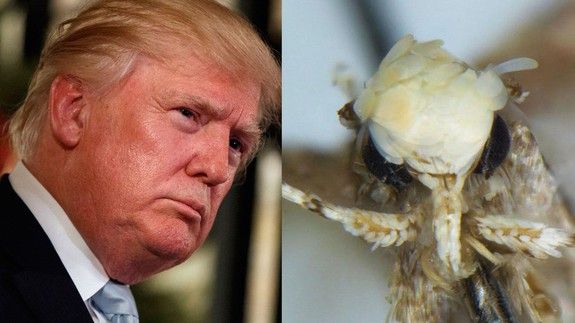Donald Trump has just had a new species of moth named after him. The moth was discovered by scientist Dr Vazrick Nazari when they were looking at a collection of moths from the Museum of Entomology, at the University of California in America, and was named Neopalpa donaldtrumpi.
The new species is described in a recent issue of the journal ZooKeys and is described as a small insect with a wingspan of less than a centimeter, orange-yellow and brown colored wings, and bright yellow scales on its head, according to the newspaper.
It was these scales, which are present only on the heads of adults, which inspired the researcher who discovered the species, evolutionary biologist Dr. Vazrick Nazari, to name it after the soon-to-be 45th President of the United States and his rather distinctive hairstyle.
Of course, Mr. Trump will have some catching up to do to equal his predecessor, Barack Obama, when it comes to the number of species named in his honor: late last year, a newfound species of basslet was named after President Obama, and as the Post noted, the 44th President also inspired the names of a type of lichen and a now-extinct species of lizard.
Dr. Nazari discovered Neopalpa donaldtrumpi while looking through materials borrowed from the Bohart Museum of Entomology at the University of California, Davis. During his review, he discovered several specimens that did not match any known species, and after extensive analysis, he determined that they belonged to a new species of twirler moth.
The newly described species is the second belonging to the genus Neopalpa and shares a habitat that includes California, Arizona and northern Mexico, with its relative, Neopalpa neonata. Yet the two can be easily distinguished by the yellowish-white head scales which helped inspire the name given to Neopalpa donaldtrumpi – which, Dr. Nazari said, is all in good fun.
“I hope he takes it with the good spirit as it is intended,” he told the Post. “We need the next administration to continue protecting vulnerable and fragile habitats across the United States.” He added that his opinion of the new President was “inconsequential,” as he is Canadian, but noted, “I wish him success in his job because if he succeeds, the United States succeeds.”
In all seriousness, however, Dr. Nazari said in a statement that the discovery of this new species in the fragile dune habitats of southern California “underscores the importance of conservation of the fragile habitats that still contain undescribed and threatened species.” By giving the species a unique name, he explained that he hoped to “bring some public attention to, and interest in, the importance of alpha-taxonomy in better understanding the neglected micro-fauna component of the North American biodiversity.”
Agencies/Canadajournal
 Canada Journal – News of the World Articles and videos to bring you the biggest Canadian news stories from across the country every day
Canada Journal – News of the World Articles and videos to bring you the biggest Canadian news stories from across the country every day



